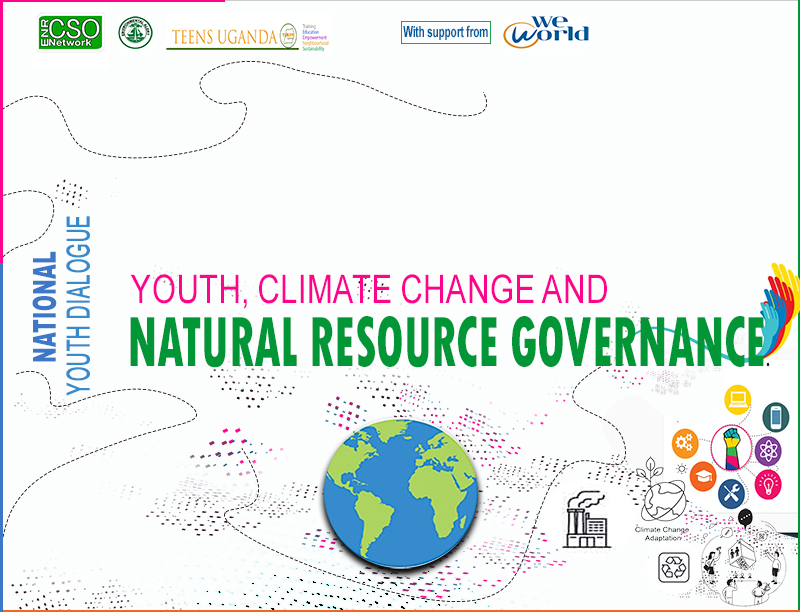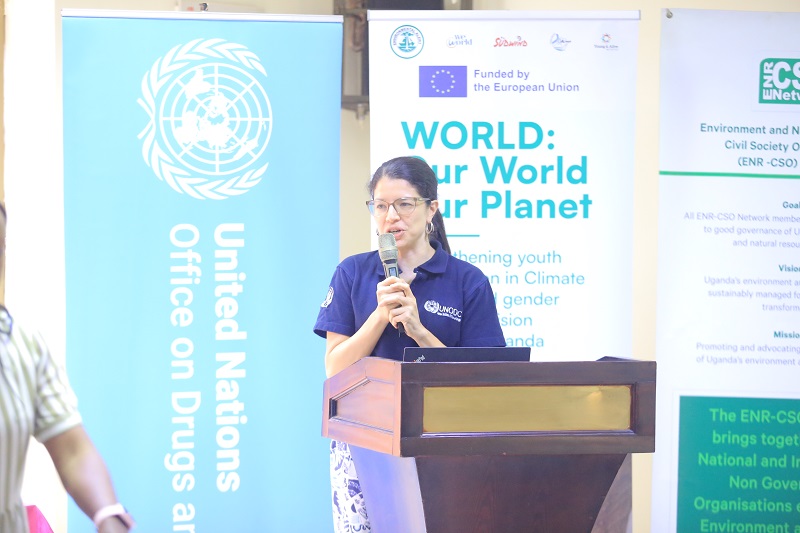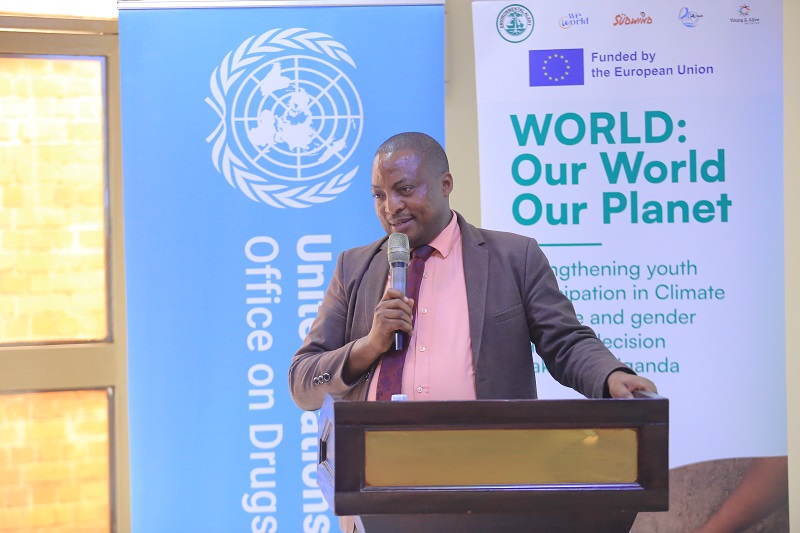
National Youth Dialogue

Youth Empowerment for a Sustainable Future.
“We are celebrating International Youth Week with the theme: ‘Youth Empowerment for a Sustainable Future.‘ This theme is timely for the Government of Uganda, civil society organizations, individuals, and others to create spaces for dialogue among youths.
It is essential for their voices to be heard, for them to network, and to learn from each other, enabling young people to develop appropriate solutions to address the negative impacts of climate change at local, national, and international levels.
We would like to express our gratitude to donors such as the European Union for providing funding to support this initiative through agencies like Environmental Alert (EA), WeWorld Italy, and UNODC .” Jacinta Nekesa Nangabo, Team Leader at Environmental Alert (EA), stated while addressing the Participants at Piato Restaurant, Kampala.

Sustainability:
KIGONGO ROBERT, the Sustainable development analyst, said, “As we commemorate the International Youth Day 2025, our role is to enhance capacities through training and climate financing to build resilience towards accelerating Planet Sustainable Development Goals.
“According to Mr. KIGONGO, they have trained more than 3 cohorts in partnership with UNICEF and are proud that many of the trainees have come up with Climate action innovations and grassroots activities, signifying the true, meaningful participation of young people.”The young people are the biggest stakeholders of the future, therefore it’s not only their critical role to climate action and environmental conservation but rather an indictment as potential victims.” Mr. KIGONGO ROBERT added.
He also mentioned that the National resource management starts with sound land use and ends with Sound land use, quoting one of the greatest heroes in Africa and beyond, Nelson Mandela, that “It’s all our duty to save the Environment, don’t wait for anyone, start now to conserve, protect, and restore the Environment.” WeWorld, European Union, UNODC

Vanessa Nakitto, a conservation biologist and the Environment and Natural Resource Civil Society Organization (ENRCSO) Youth Activist, said, “Youth are not just the future leaders but active change-makers, driving solutions in the present.”
She emphasized that young people possess the creativity, energy, and resilience needed to tackle pressing environmental challenges. According to Miss Vanessa, inclusive action where all voices, especially those of youth, women, and marginalized groups, are heard is urgently needed to ensure the sustainable stewardship of Uganda’s forests, water bodies, wildlife, and other natural resources.

Atwine Peninah, the Programs and Partnership Coordinator at Environmental Alert
“In the spirit of International Youth Day, we intend to build an informed, connected, and action-driven generation that is not only aware of environmental challenges but also empowered with the knowledge, skills, and networks to take decisive action.
We seek to inspire a sense of responsibility among young people, foster collaboration across communities, and drive innovative solutions that protect our planet’s biodiversity, restore degraded ecosystems, and promote sustainable living.”

UNODC: Uganda’s Forests Under Siege.
Forests are crucial for biodiversity, climate regulation, and the sustenance of communities. Yet, for the past decade and beyond, they have faced relentless threats: unsustainable agricultural practices, industrialization, unchecked urban expansion, forest crime, climate change, and biodiversity loss.
The United Nations Office on Drugs and Crime (UNODC) defines forest crime as the illegal exploitation of flora, including unauthorized trading, harvesting, importing, exporting, processing, or consuming of forest resources, in violation of national and international laws.
“These forest crimes are progressing at a rapid rate since 1990, with an estimation of 420 million hectares have been lost through the conversion of forests to other land uses, and this is much more noticeable in Africa, where between 2010 and 2020 almost 4 million hectares were lost making the biggest continent to lose forests followed by South America.” Alejandra Euceda, the Programme Coordinator for Forest Crime at UNODC, said during the National Youth Dialogue.
UNODC said that according to INTERPOL, bigger Logging is responsible for 15 to 30% of global timber production and accounts for 50 to 90% of forest activities in key producers, and to put to your attention, “The global timber market is estimated to be 370 billion, making it the world’s third largest transnational Crime.”
Links between transnational and organized crime are tightening, prompting UNODC to intensify its efforts against illegal logging. Ranked as the world’s third most valuable transnational crime after counterfeiting and drug trafficking, illegal logging drains an estimated $17 billion from Africa each year, weakens governance, fuels corruption, and drives conflict and insecurity across the continent.
“The economy in Uganda is very reliant on natural resources, and this leads local communities to place significant force on these forest resources, leading to unsustainable use of forests, and all these other drivers like commercial agricultural production, which includes sugar canes, maize, rice as well as charcoal production, are all contributing factors to deforestation,” Alejandra added.
She also mentioned that to address these ongoing issues, UNODC is using “A Crime Scene to Courtroom Approach,” which works at all stages, addressing the issues from the root causes, looking at prevention efforts, detection, working with Law enforcement and other frontline actors such as the Civil Society Organizations, Youth, and development partners.

Kampala Urges the Youth to Exercise Constitutional Rights in Combating Illegal Forest Activities.
Natural Resource Governance refers to the decision-making processes that guide the control, management, and use of the environment and its resources.
In Uganda, this governance carries a constitutional obligation to involve all citizens, including the youth, in shaping how these resources are protected and utilized.
“Charcoal burning has been a very big problem to us as a sector and we have been dealing with it in different ways including a ban we put in 2023 and we have been trying to implement the ban even though these charcoal burners are becoming more cunning and changing in tactics however now more environmental protection agencies have been put on alert over charcoal.” Bob Kazungu, the Assistant Commissioner for Forestry at the Ministry of Water and Environment MWE, said during the National Youth Dialogue.
According to Bob, he said that before one burns charcoal, they should undertake a screening because when you look at the National Environment Act of 2019, one should have an environmental natural resource certificate or policy brief before getting involved in charcoal burning, even when we cannot run away from charcoal now.
“Every Ugandan has a right to stop any illegality by the constitution, and the youth are very vibrant in helping out against these illegal people and ask for documentation with guidance from the authorities to try and stop this illegality,” Bob added while encouraging the Youth to take part in Environmental Governance.
